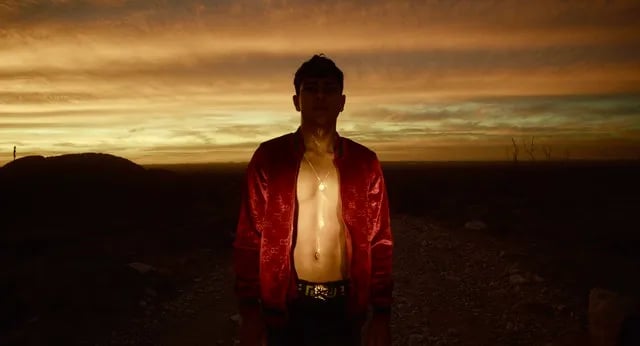Andor’ Star Diego Luna on Producing Venice Drama ‘On the Road’: ‘I Can’t Really Compare This Film to Anything I’ve Been Involved in Before’ (EXCLUSIVE)
According To The variety Sex, drugs and big rigs feature prominently in David Pablos’ edgy road movie “On the Road” (“En el camino”), which premieres Sept. 4 in the Horizons section of the Venice Film Festival. Variety debuts the trailer in exclusivity and speaks to Pablos and “Andor” star Diego Luna, who is one of the film’s producers. The drama follows Veneno (played by non-pro Víctor Miguel), a headstrong young drifter who survives by seducing truck drivers at 24-hour roadside diners called cachimbas. Eager to escape, he crosses paths with Muñeco (Osvaldo Sánchez, “Pedro Páramo”), a guarded long-haul trucker who keeps others at arm’s length. Reluctantly, Muñeco lets him tag along through the rugged, hyper-masculine world of northern Mexico’s highways. As an unexpected closeness forms between them, Veneno’s troubled past begins to catch up with him — placing both of their lives in jeopardy. The trailer (below) introduces its lead characters in the hermetic world of long-haul truck drivers as it hints at the imminent danger that will change their lives. On why he decided to board the film, Luna said: “When I read the script, I found it very powerful, very moving, very emotional and at the same time revealing of a Mexico we rarely see, lost places that we’re not even aware of, where life happens in all its richness and complexity. I can’t really compare this film to anything I’ve been involved in before.” Luna credits the film’s lead producer Inna Payán at Animal de Luz (“La jaula de oro”) for introducing the project to him while working on the film they are both producing with Spain’s Inicia Films, his fifth directorial outing, “Ceniza en la boca” (“Ashes in the Mouth”). Getting involved with “On the Road” has meant a lot to him: “I love producing and I love seeing the process of others. And David’s process is quite enriching to observe.” Pablos cites the book “Los Hijos del Camino” (“Sons of the Road”) by documentarian Jose Maria Castro Ibarra as the main source of inspiration for the film. “He wrote the book after spending years traveling across Mexico with truck drivers and visiting cachimbas throughout the country. In the book, he talks a lot about the social dynamics among truck drivers, the nomadic lifestyle and the relationships that develop in the cachimbas—because many of the women who work there form emotional relationships with the drivers,” Pablos related. “And I must emphasize, not all cachimbas involve drugs and prostitution, but many do. Many cachimbas are controlled by the drug cartels, or have agreements with certain cartels. Not all, but many. So he dissected the life of truck drivers at various points across the country. I read his book, reached out to him, and we had several in-depth conversations. He was very generous in sharing his insights. After that, I used his contacts to reach out to truck drivers who, once they trusted me, would open up. At first, they can be a bit reserved, suspicious even, because the trucker world is very closed off. But once they open up, they’ll tell you everything,” he added. To cast his mostly non-pro actors, they met with several truck drivers, but kept running into the same issue – either they wouldn’t show up or they’d arrive very late. “So we had to limit their appearances to specific moments in the film and focus the rest of the casting elsewhere. We searched in countless places: on the outskirts of Ciudad Juárez, in working-class neighborhoods, auto repair shops—even rehab centers and some gyms,” he related, working closely with his casting director, Eduardo Giralt, to develop a strategy to find the profiles they sought. Preparing his mostly non-pro actors took months of preparation, as he worked closely with Patricia Ortiz, who was both acting coach and intimacy coordinator. “The theme of masculinity runs throughout the film from start to finish. There are many moments where there’s a mockery of this hegemonic masculinity, and because of that, I was clear that there were certain scenes, especially those involving sexuality and the relationships between these characters, that couldn’t be shy or restrained. It had to be the complete opposite. If it needed to be shown, I had to show how sexuality is expressed in the aesthetic of the cachimbas,” said Pablos, who added that no prosthetics were used. Despite of or because of the hyper-masculinity of the film, he chose to work with female cinematographer Ximena Amann (“Sujo”), who he’s known since his film school days, and production designer Belén Estrada. “When I sat down to talk with Belén for the first time, I knew she was the one, and I knew it not just because of her vision for the film, but because she understood these worlds and grasped the tone,” Pablos mused. Luna said of Amann: “The way she captures the landscapes, her patience with the light, and how she positions the camera so precisely – it’s all incredibly thoughtful. There isn’t a single shot that feels excessive or out of place. She’s very economical in her approach, and that restraint makes every frame more powerful.” Speaking of a thru-line in his films, Pablos reflected: ” I believe that family is a recurring theme in all of my films, and specifically, the paternal figure. The North also becomes an obsession for me. I’m from the North, from Tijuana. I really connect with the landscapes of the North, with the people, with the accents, with the way they speak—it’s a way of life that’s very similar across the entire northern part of the country. I feel it has been very underrepresented, at least until now.” He added: “Besides family and the paternal figure, I’m also very interested in characters that might make some people uncomfortable, or in telling stories about characters who don’t always get visibility. I like turning to those overlooked spaces. I’m drawn to stories that can provoke discomfort—stories that question, above all, the status quo.” Aside from La Corriente del Golfo, the company founded by Luna and Gael García Bernal, the film’s other co-producers are Mexico’s Año Bisiesto Prods. and The Maestros Cine. It’s also financed by a raft of private companies that were tapped via Mexico’s Eficine incentive. Luna, Payán, Luis Salinas and Enrique Nava are producers. “On the Road” plays next at the Morelia Film Festival after Venice. Berlin-based M-Appeal handles international sales
bitafilm
8/26/20251 min read


My post content
